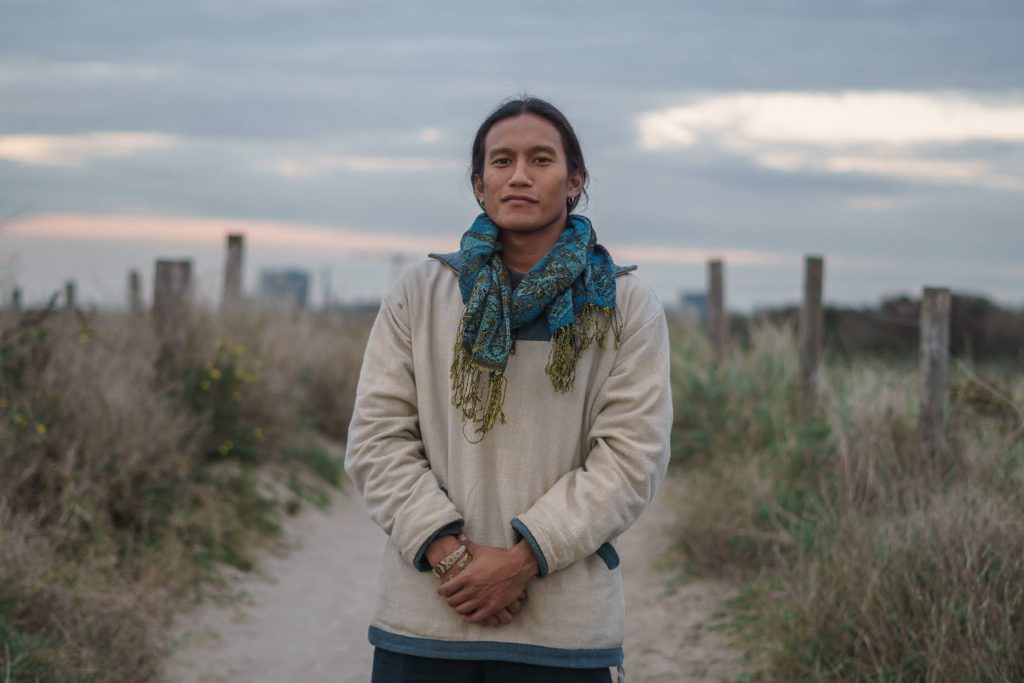‘It helps when you go through transitions together’


Climate change, plastic in the oceans, species going extinct… We hear a lot of worrying news about the sustainability of our planet every day, but what does it actually mean for you and me? Buro EU went out into the streets to talk to you, the generation of the future in The Hague, about sustainability. Does it keep you up at night or not at all? What do you think should be done societally and politically? And what role are you playing to be part of the solution?
Nicolas (21) is the first one to take the floor in this series of Sustainability Stories from The Hague.
Please, introduce yourself!
‘I am Nicolas from Indonesia. I am 21 years old and am studying Industrial Design at the Hague University of Applied Sciences.’
When did you first hear about sustainability?
‘The topic of sustainability was introduced to me as early as middle school, but slipped my mind. It was reintroduced when I got here and began my studies. By going into university life, I wanted to learn more about the world and in doing so I came across the topic of sustainability.’
What are your first associations with the word sustainability?
‘I first think of the things that we consume, whether it is food or products. This point of view is also coming from my studies in Industrial Design, because that is what the courses really mostly talked about. On the one hand the word greenwashing comes to my mind when I think of the topic of sustainability in design and the ways in which people can sell it off as an idea.
On the other hand, I recently read a couple of books that changed my mind because they talked about the potential of design for dealing with crises. They addressed not only about the environmental aspect of the products we make, but the environmental crisis that we are facing in general, and the designer’s potential to help and solve this issue as well as social inequalities, and larger systemic issues.’
Can you give an example of that?
‘Yes, for instance there are two designers who are looking at how they can create a filling for 3-D printers made of biomaterials, more specifically: fungus mycelium. Most 3-D printers currently use plastic to print. By using this specific biomaterial, it would also be possible to grow your own mycelium which means creating accessibility. In the long run this can have an effect on how we produce things and subsequently becomes a much larger thing.’
Looking at your daily life, are you currently contributing to be a part of the solution?
‘Definitely. Since I am in the Netherlands, I rarely eat meat. Transport wise, I was really looking for ways in which I can travel for instance to Spain by land, rather than by plane. Recently, I have switched to ecological dishwashing and laundry detergent. And I have also been looking into less toxic toothpaste, as well as shampoo. I mean these are like small things that are product-based. In the long run, I would like to include some form of food sovereignty to my life, in which I grow my own food or get access to more organic and fresh food.’
And how do you feel about changing your habits and behavior?
‘In general, I think changing a habit is kind of uncomfortable. This is probably why it is difficult for most people to act sustainable. A lot of people are afraid of being uncomfortable and just don’t want to do that. In any transition there is this feeling like for instance when you buy a more sustainable shampoo or dishwasher detergent and think: ‘It’s not as soapy and bubbly and nice smelling as the one I used before. For me, it starts with the awareness that I should not buy a specific product because it’s unsustainable and then what actually makes you to take the next step to do it and act upon it. I cannot pinpoint on one thing that makes you act upon it, but I do feel it helps when you go through transitions together.’
Who helps and supports you in make these transitions?
‘An old roommate that I had, brought a lot of these things to my attention, as well as the awareness of the crisis that is going on. When I see what the people around me are doing, I think: ‘Oh that is nice, I’ll do it as well.’ My current roommate is similar and she is always open to things and in the house, we try to transition and change together. Friends also play a part. One of my friends for instance does dumpster diving and the amount of eatable food that he collects just by going to a supermarket or even a market is a lot. He finds for instance a box with peaches in which only one is bad. Hearing this from him made me realize that we are wasting a lot of food. It is a really big issue.’
Besides the people around you, do you have other sources of information and inspiration?
‘Yes. For instance, it starts with a podcast like the podcast of Julia Watson in which she talks about her book called Lo-TEK: Design by Radical Indigenism. After hearing this, I bought and read her book with a collection of knowledge and insights from indigenous groups around the world, in many diverse biomes, and how they have created a symbiotic relationship with different species and the environment around them. These groups actually take care of their environment and benefit it from this, rather than exploiting it. The author also talks about the root of our bias preference over Western technology versus the technology that the indigenous people have. She traces this back to the Enlightenment era in Europe that gave Europeans a justification towards organizing and exploiting a lot of the world.’
Lastly, what difficulties do you experience in becoming more sustainable?
‘Every time I hear the biodiversity that we are losing at the moment, it brings me sadness. All the species that are going extinct through increased deforestation and climate change and loss of natural habitat, as well as the displacement of indigenous people around the world. I think in both cases there is a sense of culture that is being lost, whether it is human or nonhuman. And this is something that has taken generations if not thousands of years to evolve and come into being. Sometimes this really gets to my emotions, and by letting these emotions go through me, it also gives me more motivation and drive to contribute and play my part.’
